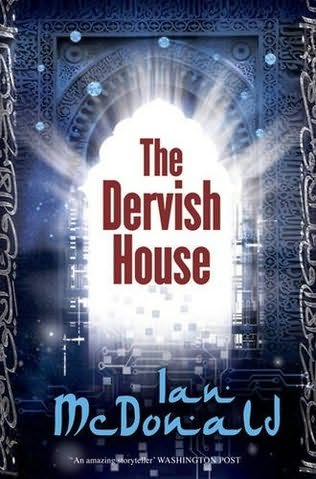Hachette
Review by Christine Tursky Gordon
Turkey in 2027 is a member of the EU, the meeting point of West and East, and of Christianity and Islam, a place of nanotech sweatshops, power struggles, hidden and open religious history, and the driving pulse of business amongst the heat and the smell of spices. Cosmopolitan, crowded, dynamic Istanbul seeps through on every page; McDonald captures the culture, the voice, and the atmosphere of the city just as evocatively as he did for readers in Brasyl.
In The Dervish House McDonald pulls together disparate characters whose stories dovetail in a seven-day-long ticking clock buildup of tension. A boy with a damaged heart sees a terrorist explosion on a tram through the remote camera on his BitBot and realises that someone else also has a hidden robot watching those who flee the aftermath. Necdet runs from the tram, amazed to be alive, but soon starts seeing djinns and spirits interwoven with the scenes of his daily life. Leyla misses the explosion, misses her job interview but finds work in a relative’s nanoware startup and must negotiate with both family and local criminal groups to secure funding. Adnan snorts nanoware brain enhancers just like his commodity trader colleagues, but he plans a massive fraud involving radioactive Iranian gas while his antique trader wife Ayse is offered an outrageous sum to quietly find a mythical artefact. Greek-out-of-water Georgios is a retired economics professor with a poisoned past of radical activism who is suddenly, incongruously invited to join a government think tank.
The implications of the terrorist attack trickle slowly into the open as the characters follow their own paths, looming larger and darker than anything the government could have expected. McDonald has created a rich, vivid thriller that is beautifully written.
Review by Christine Tursky Gordon
Turkey in 2027 is a member of the EU, the meeting point of West and East, and of Christianity and Islam, a place of nanotech sweatshops, power struggles, hidden and open religious history, and the driving pulse of business amongst the heat and the smell of spices. Cosmopolitan, crowded, dynamic Istanbul seeps through on every page; McDonald captures the culture, the voice, and the atmosphere of the city just as evocatively as he did for readers in Brasyl.
In The Dervish House McDonald pulls together disparate characters whose stories dovetail in a seven-day-long ticking clock buildup of tension. A boy with a damaged heart sees a terrorist explosion on a tram through the remote camera on his BitBot and realises that someone else also has a hidden robot watching those who flee the aftermath. Necdet runs from the tram, amazed to be alive, but soon starts seeing djinns and spirits interwoven with the scenes of his daily life. Leyla misses the explosion, misses her job interview but finds work in a relative’s nanoware startup and must negotiate with both family and local criminal groups to secure funding. Adnan snorts nanoware brain enhancers just like his commodity trader colleagues, but he plans a massive fraud involving radioactive Iranian gas while his antique trader wife Ayse is offered an outrageous sum to quietly find a mythical artefact. Greek-out-of-water Georgios is a retired economics professor with a poisoned past of radical activism who is suddenly, incongruously invited to join a government think tank.
The implications of the terrorist attack trickle slowly into the open as the characters follow their own paths, looming larger and darker than anything the government could have expected. McDonald has created a rich, vivid thriller that is beautifully written.
This review first appeared in the Aurealis Magazine subscriber newsletter.


No comments:
Post a Comment